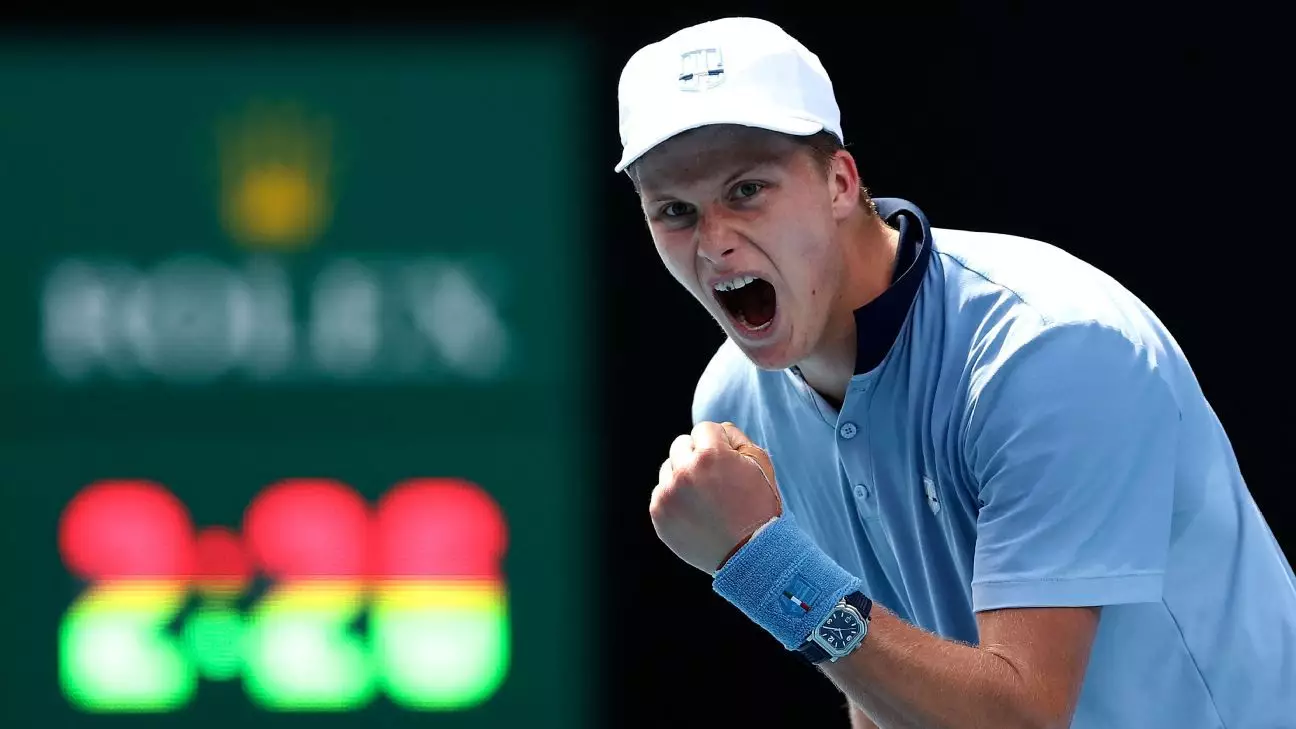Tennis prodigy Jenson Brooksby embodies the struggle and triumph that many athletes experience in their careers. After making significant waves within the tennis community and nearly reaching the peaks of professional success, Brooksby found himself grappling with various adversities that momentarily derailed his ambitions. Once ranked 33rd in the world and the embodiment of potential at just 21 years old, Brooksby now faces the challenges of returning to the sport after a prolonged period out due to injuries and personal difficulties. As he approaches his anticipated return to the professional circuit, including his participation in the Australian Open, Brooksby reflects on his journey and the lessons learned along the way.
Brooksby’s story is not just one of athleticism; it extends into deeply personal territories. During an interview with the Associated Press, he openly shared the complexities of living with autism spectrum disorder (ASD), a revelation that many have rarely discussed in the competitive sports arena. His decision to speak about this aspect of his life represents a moment of empowerment—for himself and those who may suffer in silence about their own challenges. While many athletes focus solely on physical training and competition, Brooksby highlights the significance of mental fortitude and self-acceptance.
For Brooksby, the past two years were laden with frustrations that tested his resilience. After sustaining multiple wrist injuries and facing a controversial ban related to missed drug tests, Brooksby found himself grappling with a sense of loss, not just from the sport he loves, but also from the identity he had cultivated. The complexities of his journey raise critical questions about mental health—issues that resonate not only within the realm of sports but in broader society as well. Brooksby candidly described these years as “frustrating” and admitted that they opened the door to feelings of depression.
In moments of struggle, Brooksby showcased remarkable strength. He emphasizes that the challenges he faced, particularly the stigma surrounding autism, have contributed to his development as an athlete and as a human being. By evolving his communication skills with the support of therapists from a young age, Brooksby learned to channel his experiences into enhancing his performance on the court. He articulates that this condition has some advantages, especially in high-pressure moments during matches, where focus and detailed attention become critical components of success.
Brooksby recognizes that ASD presents both advantages and disadvantages in his tennis career. Although he can concentrate intensely on specific details during matches, he also experiences emotional volatility in moments of loss or frustration. This duality, stemming from his condition, complicates his emotional response on the court, leading Brooksby to share that he can occasionally manifest outbursts when faced with setbacks. This aspect of his personality presents an interesting paradox; what some might see as a limitation could also be influential in forging a competitive edge.
Support from professionals like Michelle Wagner, a board-certified behavior analyst, has been pivotal in Brooksby’s journey. Working closely with him from a young age, Wagner has been instrumental in his development and adaptability. The road to self-improvement is ongoing, but Brooksby manages to embrace his autism as an integral part of his identity rather than a hindrance. His evolution reflects not just growth but a paradigm shift in how athletes can embrace their unique traits as strengths rather than weaknesses.
As Brooksby prepares for a fresh start on the Challenger Tour, he is not just returning to play; he is reshaping how he perceives himself in the sport. His experiences during his hiatus have offered him new insights into resilience, self-advocacy, and the importance of mental health. Brooksby aims to redefine his narrative—not merely as a player returning to competitive form but as a passionate individual eager to share his story and openly communicate about life’s obstacles.
With the dawn of a new year and the resurgence of his tennis career on the horizon, Brooksby acknowledges the role of both personal struggle and professional aspirations in shaping his identity. He asserts that vulnerability is not a weakness; rather, it is a testament to one’s strength. As he prepares to face competitors and reconnect with audiences worldwide, Brooksby adopts an honest approach, inviting them to see beyond the athlete and into the person who continues to battle through life’s challenges.
Jenson Brooksby’s narrative serves as a reminder of the complexities and triumphs inherent in the human experience. His journey is not solely about achieving tennis accolades; it encompasses an authentic saga of self-acceptance, resilience, and an unwavering commitment to himself amidst the whirlwind of competitive expectations. As he steps back onto the court, Brooksby projects an image of not just a fighter but also a beacon of authenticity for those navigating similar paths.

